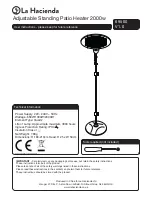
12
GB
IMPORTANT!!! Carefully read this service manual before
you start to use, repair or clean the heater. Improper use of the
appliance may cause serious injuries, burns, electric shock or fire.
1.
Safety instructions.
The appliance has been designed for heating closed areas such as e.g.
warehouses, shops and houses. Models with power: 2; 3; 3,3; kW are
not designed to work in greenhouses and on buildings site.
WARNING !!! Do not place the heater directly under the wall
outlet. Do not touch internal components of the heater.
This appliance is not intended for use by persons (including children)
with reduced physical, sensory or mental capabilities, or lack of
experience and knowledge, unless they have been given supervision or
instruction concerning use of the appliance by a person responsible for
their safety.
Children should be supervised to ensure that they do not
play with the appliance.
•
-
Do not cover the heater when it is operating. The appliance
may get overheated.
•
Do not operate the appliance close to humid places such as water
tanks, bathtubs, showers or swimming pools. Any contact with water
may be the reason of short-circuit or electric shock.
•
The heater should be kept at a safe distance from flammable
materials. The minimum safety distance should not be inferior to 0.5
m, otherwise you run the risk of starting the fire.
•
Do not use the heater in dusty spaces or rooms where gasoline,
solvents, paints or other volatile and inflammable materials are
stored in order to avoid the risk of explosion.
•
The heater should not be used close to the curtains or other textiles
in order to avoid the risk of fire.
•
Be particularly cautious when using the heater in the rooms
frequented by children or animals.
•
The heater should be supplied from a source meeting the
requirements specified on the rating plate.
•
Use only a feeder cable including the earth lead in order to avoid
electric shock in emergency situations.
•
Do not unplug the heater by pulling the wire out of the wall socket.
•
Unplug the heater when not used in order to avoid accidental
damages.
•
Before you dismantle the casing check if the feeder cable has been
pulled out of the wall socket. Internal components may be live.
2.
Unpacking and transport.
•
Open the package and take the heater out including all the safety
locks installed for the period of transport.
•
Should the appliance seem damaged, notify immediately the seller
of the same.
•
Transport the heater using the lifting eyes No. 1 shown in Figs. 1,
page 2.
•
The heater should be transported in original package including the
safety locks.
3.
Description of individual components.
See Figs. 1-2 Page. 2.
1) Lifting eye
8) Back protective grid.
2) Thermostat
9) Power supply cable.
3) Front protective grid
10) Base foot.
4) Heating element
11) Fan.
5) Casing
12) Motor .
6) Switch
13) Plug.
7) Cable penetration.
4.
Switching on.
WARNING !!! Carefully read this service manual before you start
to use the heater. The instructions contained herein will allow you
to use the appliance in a safe manner.
Make sure the power supply cable has not been damaged. Damaged
cables should be immediately replaced by the seller, approved service
centre or competent personnel. Moreover, check if the technical
parameters of power supply source comply with the requirements
specified on the rating plate.
Place the appliance in its upright position. Make sure the switch is in
its "0" position shown in Fig. 3. Connect the heater to the power
supply source. Turn the switch and leave it for 5 seconds in the
positions as follows:
•
1
st
degree of heating: Fig. 4;
•
2
nd
degree of heating: Fig. 5,
•
3
rd
degree of heating: Fig. 6.
5.
Switching off.
Turn the switch to its "0" position.
6.
Temperature control.
The temperature in the room may be set by means of the control knob
(Fig. 7, page 2). Once the pre-set temperature is produced, the
thermostat will automatically switch the heating elements off while
the fan will continue to operate thus protecting the appliance from
overheating. If the temperature falls down beyond the pre-set value,
the system will switch the heating elements on again.
7.
Thermal circuit breaker.
The appliance has been equipped with an integrated thermal circuit
breaker ensuring high safety level. The breaker will automatically
switch the power supply off once a limit temperature is exceeded.
8.
Out-of-season storage.
Should the appliance remain idle for a long period of time, clean
it before shoving by blowing the inside with compressed air. The
heater should be kept in a dry and clean place. Before you start using
it again make sure the power supply cable has not been damaged. In
the case of any doubts contact the seller or approved service centre.
9.
Functional inspection.
The appliance should be checked at least once a year by competent
service personnel approved by the manufacturer. Any inspections or
repairs should be conducted by competent personnel only.
10.
TROUBLESHOOTING
PROBLEM
REASON
SOLUTION
The motor operates while the appliance does
not heat.
Thermostat has been damaged.
Heating element has been damaged.
Replace the thermostat.
Replace the heating element.
The motor does not operate while the heating
elements are hot.
Motor has been damaged.
Fan has been stopped.
Switch has been damaged.
Replace the motor.
Unlock / clean the fan.
Replace the switch.
The whole appliance does not operate.
Electric circuit open.
Switch has been damaged.
Check power supply connection.
Replace the switch.
Reduced air flow.
Foul air duct.
Motor has been damaged.
Open the air duct.
Replace the motor.
Summary of Contents for B 1,8 ECA
Page 6: ...32...




























